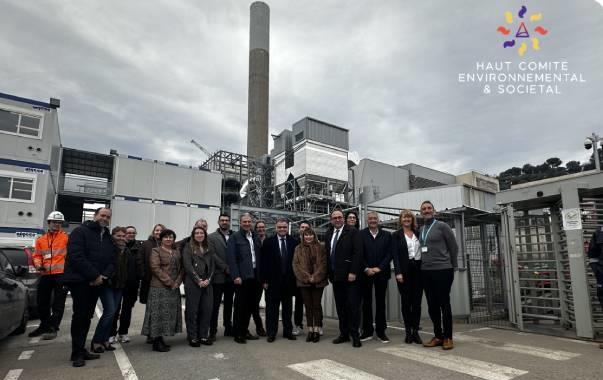For the contract of Arianeo, the new green energy production center of the Nice Metropolitan Area, Veolia and the Nice Côte d’Azur Metropolitan Area have devised an open and participative governance structure inspired by Veolia’s stakeholder dialogue initiative, “+1, ecology turned into actions”. An Environmental and Societal High Council bringing together the stakeholders of the contract, namely the Nice Côte d’Azur Metropolitan Area, neighborhood committees, Banque des Territoires, and Veolia, met for the first time on January 24, 2024.
Tomorrow’s energy will be decarbonized and affordable and produced at local and regional level. This approach fully informs Arianeo, the new green energy project of the Nice Metropolitan Area, which will cover the local and renewable energy needs of 24,000 households using non-recyclable waste.
Construction work is under way on modernizing the Metropolitan Area’s waste recovery unit in partnership with Banque des Territoires. The initiative stands as Veolia’s largest industrial project in France, and Arianeo, which will be fully commissioned in 2026, will rank as the highest-performance recovery facility in France with a carbon footprint reduced to a minimum.
An industrial project focused on the neighborhood
Arianeo is located in the Ariane neighborhood in Nice, the closest residences being situated less than 100 meters from the plant. This is why Veolia and the Nice Metropolitan Area sought to open the site to the public, making it a meeting place and venue for dialogue between students, residents, researchers, associations, and even botany enthusiasts. Learning pathways have been planned for schools. A surface area of 100 m2 has been set aside for associations and residents and will house a third place. A repair café will also be created on the site to repair and teach people how to repair various objects.
As part of this openness to the population, Veolia has developed an open and participative governance structure enabling civil society to play a stakeholder role in the contract. The governance system is inspired by the Group’s stakeholder dialogue initiative, “+1, ecology turned into actions”.
An Environmental and Societal High Council (ESHC) has been formed and met for the first time on January 24, 2024. The ESHC has ten members, one-third representing project partners and two-thirds representing civil society. The High Council plays a decision-making and advisory role in the management of the project and the multifaceted performance of the contract, particularly its societal and environmental performance. The implementation and management of the participative governance structure will be supported by the methods and tools of the +1 initiative.


Pierre-Paul Leonelli, Deputy to the Mayor of Nice in charge of Cleanliness, Waste Collection, and Parks and Gardens, Vice-President of the Metropolitan Area:
“The aim of the ESHC is to make Arianeo an exemplary and innovative contract that benefits local residents.”

Christophe Ghibaudo, Communication Director, Veolia Recycling and Waste Recovery, SUD PACA:
“We proposed the ‘+1, ecology turned into actions’ method in the call for bids for the new Arianeo green energy plant with the aim of opening up the governance of the site to its stakeholders. The Environmental and Societal High Council will report on the social, societal, and environmental impact of the actions initiated as part of the activity at the site.”

Fanny Demulier, Director of Veolia’s Purpose and Stakeholders:
“Arianeo’s Environmental and Social High Council perfectly illustrates the aim of the ‘+1, ecology turned into actions’ initiative: to set up venues for dialogue with our stakeholders, in our contracts, and at local and regional level, to step up the ecological transformation with and for local
Key figures
electricity generated, or the equivalent of the consumption of 25,000 dwellings
metric tons of waste sorted and recycled
made available to associations and residents and eligible for the creation of third places
repair café planned as part of the project


